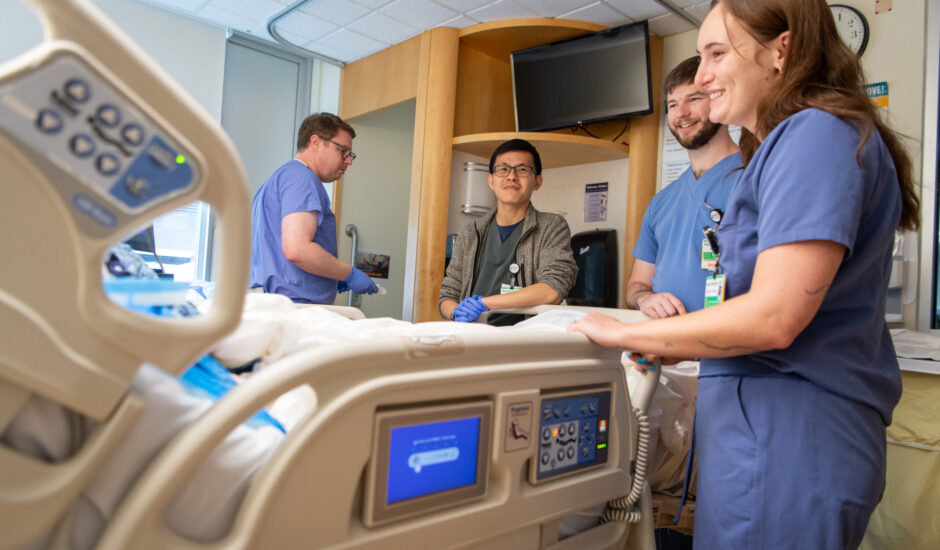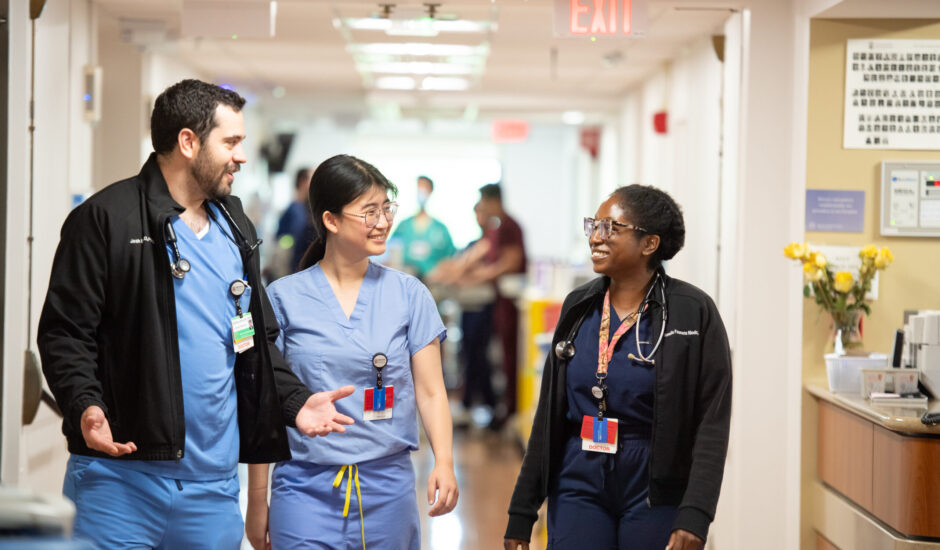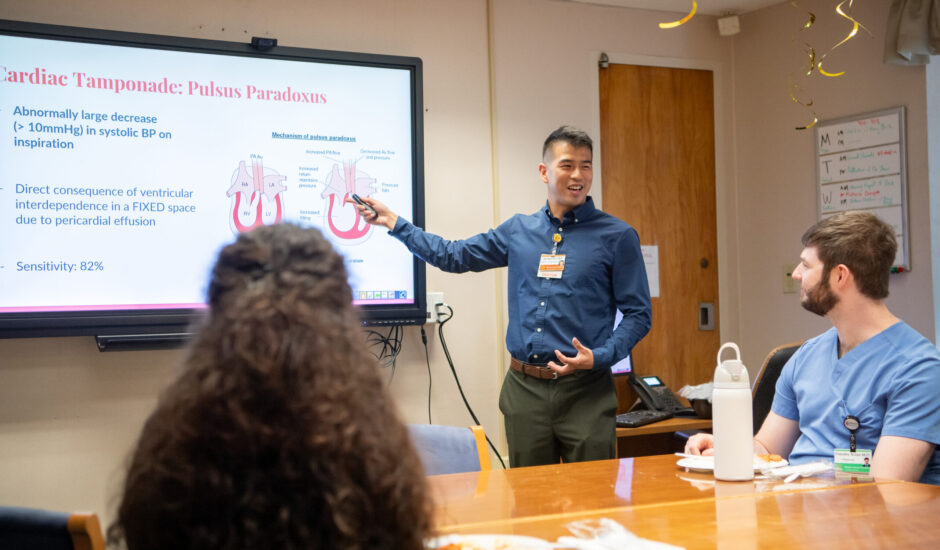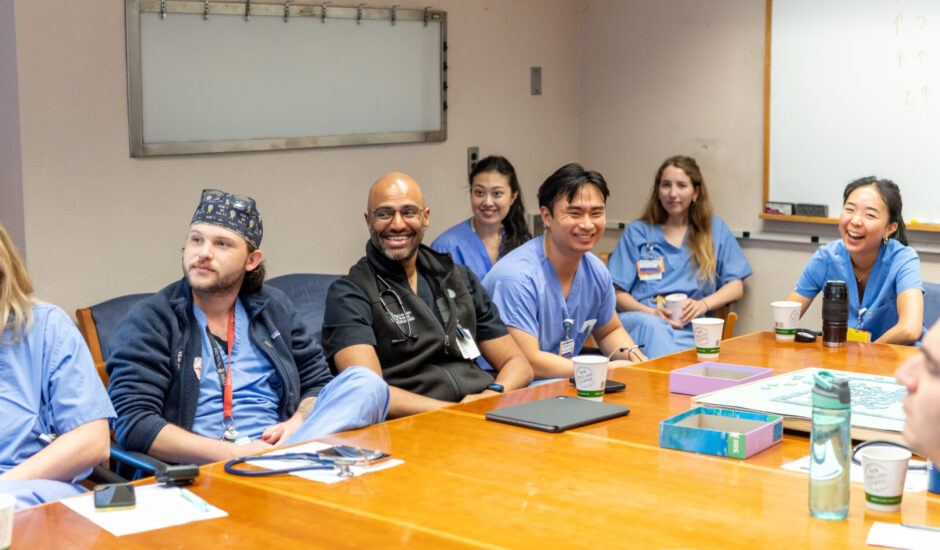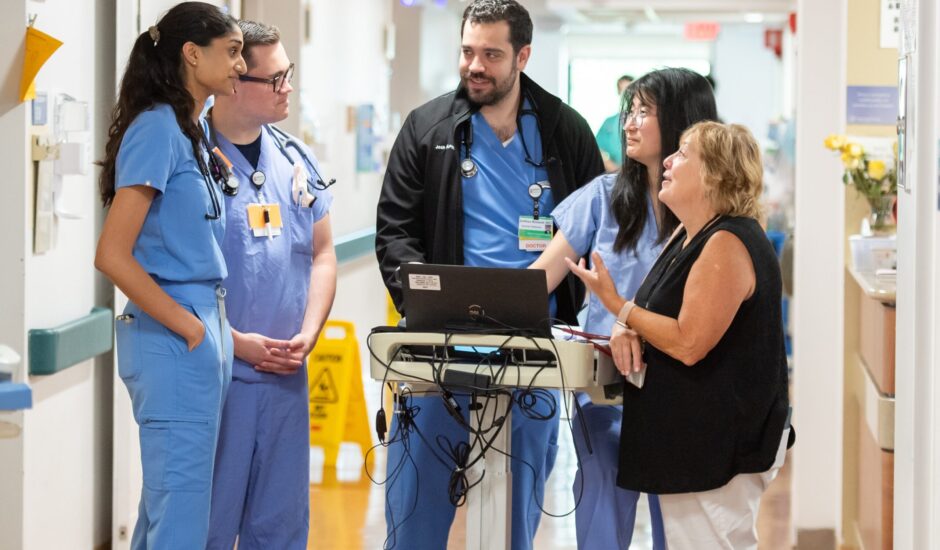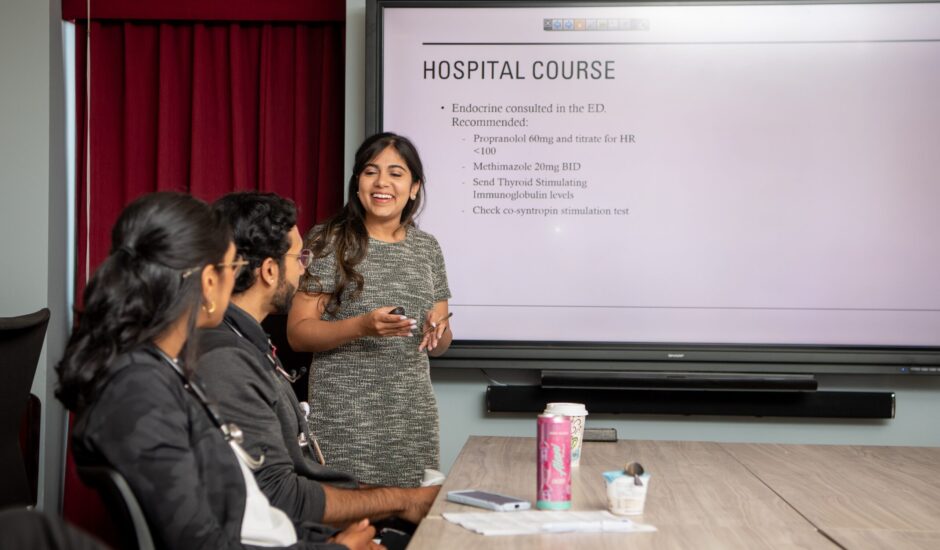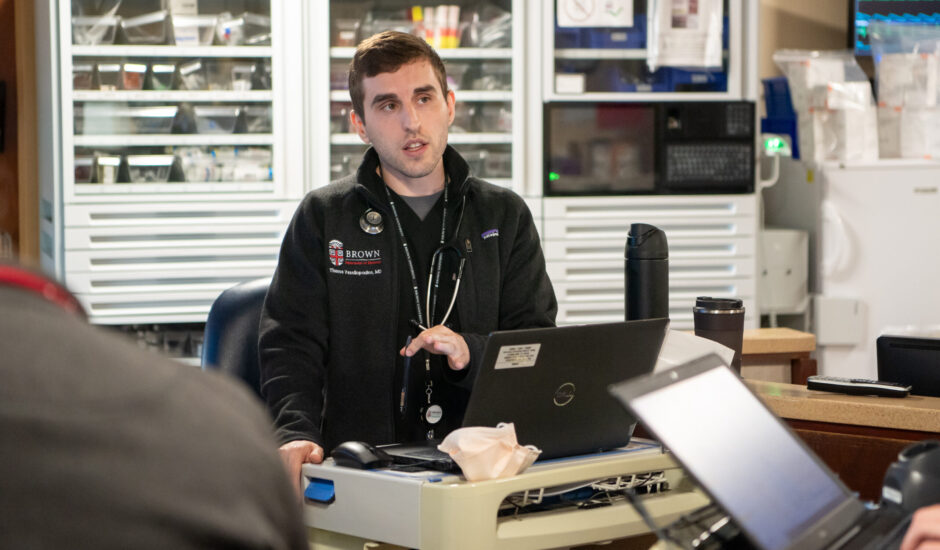- Home
- Who We Are
- From Our Chairman
- From Our Program Director
- Program Directors
- Chief Residents
- Resident Support Staff
- Preliminary Internal Medicine Residents
- Categorical Internal Medicine Residents
- GIM/Primary Care Residents
- Med Peds Residents
- BMHA
- Graduate Career Choices
- Brown University/Lifespan GME
- Arts & Humanities in Residency
- Research
- How To Apply
- Training Programs & Tracks
- Why Providence?
Curriculum & Rotations
The Brown Internal Medicine Residency provides training at three sites: The Miriam Hospital, Rhode Island Hospital, and the VA Medical Center. By offering a multi-institutional training program, we can provide our residents with several distinct, diverse populations of patients, training environments, and complementary institutional cultures.
The curriculum provides comprehensive training in outpatient and inpatient internal medicine, medical and non-medical subspecialties, emergency medicine, critical care medicine, community-based experiences and elective rotations. Residents may also design curricular variations which meet their individual goals for training. Below are reviews of selected rotations, some accompanied by resident descriptions.
General Medicine Wards
- Teaching and supervision provided by both generalist and sub-specialty full-time faculty.
- The Med B Service at Rhode Island Hospital is fully geographically based, with teams located on one floor with a single nursing team, case manager, physical therapist, etc.
- A single hospital-based faculty serve as attending of record and teaching attending for all team patients.
- On all general medical ward rotations (the majority of inpatient experiences), interns and residents admit patients until late in the evening on every fourth day, and then go home overnight while covered by the in house Night Float team.
- On the subspecialty ward services (Hematology/Oncology and Nephrology) teams admit patients until the afternoon and return home daily.
- The disease spectrum, ethnic and socioeconomic diversity, and accessibility to outstanding faculty make these rotations a critical educational experience for medical housestaff at Brown.
- Our residents typically spend four months as a PGY1, three months as a PGY2, and three months as a PGY3 on the General Medical Wards, approximately equally divided between The Miriam Hospital and Rhode Island Hospital. They spend one month each in their PGY-1 and PGY-2 years at the Providence VA Medical Center. These experiences allow the residents to develop their skills in inpatient medicine, seeing a wide variety of problems, in a position of direct responsibility.
Resident Voices - Med B Geographic Wards - Maria Vromans, MD, GIM PGY-2
" Working on the Med B geographic wards is an ideal training environment. Not only do you have the fortune of working with friendly, humble, collaborative attendings that support graded autonomy and focus on teaching while maintaining time-efficient rounds, but having rounds start around 9am gives ample time in the morning for preparation without feeling rushed. Additionally, the geographic framework allows you to become very familiar with the nursing and social support staff, who are amazing resources and advocates during your training. And, best of all, you are exposed to a variety of complex medical conditions from decompensated cirrhosis to rare endocrinopathies, infections, and new malignancies in a diverse patient population that make you well prepared for your medical career. I feel so grateful to work among colleagues who are equally passionate about learning and patient-care and keep me laughing and finding joy on a daily basis."Resident Voices - Miriam Inpatient Wards – Jessica Brar, MD, CAT PGY-3
“My time at Miriam Hospital was the perfect combination of structured academic learning and practical experience. The attendings were not only experts in their fields but also welcoming and eager to teach, making the rotation highly educational. The wide range of pathologies I saw enhanced my ability to manage complex cases and think on my feet. I left each day feeling more capable and prepared for challenges ahead. Plus, the cafeteria was an absolute bonus—definitely the best I’ve had during a rotation!”Resident Voices - VA Inpatient Wards - Sharon Kelmar, MD, CAT PGY-2
“VA wards was a unique and fun part of my experience so far with Brown IM. Because the hospital is smaller than the others we rotate at, it was nice to experience more of what it would be like to work at a community hospital. I had the chance to work closely with consultants who would just stop by our work room to teach and give recommendations, ED physicians who knew me by name and were open to discussing incoming admissions in detail, and radiologists who would invite us down and look at interesting imaging findings with them, all types of close relationships that have been harder to have at the other hospitals. It was also great to meet and work alongside residents from the Kent Hospital Internal Medicine Residency and develop professional relationships beyond just our program. Plus, the free food on the weekends and call days was always a fun bonus!”Sub Specialty Inpatient Services
- While most of our inpatient rotations are intentionally general medicine in nature, we have developed a small number of highly valuable sub specialty services through which all residents will rotate during their three years.
- Heme-Onc Services exist at Rhode Island Hospital and the Miriam Hospital. Residents work with full-time hematologist-oncologist inpatient faculty from the Lifespan Cancer Institute (LCI) and see a broad range of conditions hematologic and oncologic conditions.
- The Nephrology and Renal Transplant Service is based at Rhode Island Hospital. Residents care for patients with acute and chronic renal disease, electrolyte disorders and renal transplant related disorders. Brown has one of the leading renal transplant programs in New England.
Resident Voices - Heme/Onc Inpatient Rotation - Sovijja Pou, MD, CAT PGY-3
“I grew tremendously as a senior resident on the Med A Hematology/Oncology inpatient service. You get to manage a variety of pathologies that are either secondary to the patients’ malignancies/treatments or independent of them and consequently these patients can be quite sick. You work in a multi-disciplinary team with the heme/onc specialists, palliative care, and an amazing case management/nursing presence so I always felt supported whether it be on a medical issue or a disposition issue. Attendings also spend the time to teach near daily on relevant cancer-related topics. Although the rotation has a steep learning curve, I truly appreciated my time as it gave me skills to be a successful doctor in all parts of the hospital.”Resident Voices - Nephrology Inpatient Service - Michelle Kwon, MD, CAT PGY-3
“During my Med A renal rotation as both an intern and senior resident, I had the unique opportunity to care for a specialized patient population, those who are on dialysis and/or have a history of kidney transplantation. I was able to learn a lot about managing patients on intermittent hemodialysis and peritoneal dialysis, which are crucial experiences for understanding dialysis and CKD treatment. On the transplant side, I learned the intricacies of post-transplant care as well as the complexity behind immunosuppression. I was able to work closely with a multidisciplinary team consisting of nephrologist, transplant surgeons, nurses, and pharmacists to provide comprehensive care for this patient population. Overall, this rotation not only taught me vital skills in managing complex cases but also to have more understanding in pathophysiology and treatment in nephrology and transplant medicine.”Night Float Team
- Housestaff at all three years are assigned to a month of Night Float rotation where they will work as a team to care for patients on the teaching services.
- Intern night floats are responsible for the cross coverage care of patients already on the teaching service and are supervised overnight by the senior resident on the night float team.
- PGY-2 night float is responsible for admitting patients overnight to the Teaching Service.
- The senior resident night float is responsible for supervising the intern night floats in the care of their patients, ensuring that the "on-call" admitting teams complete their clinical tasks and leave the hospital in compliance with ACGME Duty Hour Guidelines.
- The senior night float resident is also responsible for reviewing the Intern Night Float Curriculum with the interns so as to provide the educational underpinning of their work.
- A web-based electronic sign-out system, fully integrated with our EMR, assures accurate and efficient sign-out among teams and night floats.
Resident Voices - Nightfloat Rotation - Suvithan Rajadurai, MD, CAT PGY-3
"Night Float as the senior resident is a great opportunity to not only work on your clinical skills but your leadership skills as well. As the supervising resident for the cross-coverage interns you learn to multitask more effectively than you had previously in residency. I also found it rewarding to be the senior that the Night Float 2 resident would come to in order to run plans for new admissions by. Of course, the best part is the full Night Float crew brunch everybody does once the month concludes. Overall while it’s a very challenging month you definitely emerge as a more confident and prepared resident after it’s over."Medical Intensive Care Unit/Coronary Care Rotations
- In each of these units, interns and residents work as a team, sharing night as well as day shifts together.
- There is no overnight call - rather, one of the four intern-resident teams works a stretch of night shifts in rotation.
- Dedicated on-site faculty conduct combined management and teaching rounds as well as educational conferences, set in newly redesigned, state-of-the art facilities.
- The CCU boasts a dedicated procedure area, catheterization facilities directly below the unit, and state of the art communication and work facilities.
- The MICU is the setting for a busy extra corporeal membrane oxygenation program.
- Both units participate in a variety of research programs, with the MICU serving as one of the primary study sites for the Surviving Sepsis campaign. All of the units utilize the latest electronic medical record and clinical data systems.
Resident Voices - Medical Intensive Care Unit (MICU) - Medical Intensive Care Unit (MICU) - Keara Lynn, MD, CAT PGY-2
“Rotating in the Rhode Island Hospital MICU has been one of my favorite rotations in residency so far. We have the opportunity to care for the sickest patients in the region while working as a part of a multidisciplinary team. Our attendings and fellows are extremely involved and approachable, yet allow residents to have autonomy over medical decision making, goals of care discussions, and bedside procedures. Being exposed to ECMO is an additional benefit and a great opportunity to learn more about physiology."Resident Voices - Coronary Care Unit (CCU) - Eric Ding, MD, CAT PGY-2
“The CCU rotation is an excellent opportunity to learn to care for critically ill cardiac patients (post arrest, STEMI, tamponade, etc). You will work closely with the cardiology fellows and critical care nursing staff, and learn a ton about hemodynamic management, cardiac diagnostics like EKGs/echos/catheterizations, optimizing outcomes after cardiac events, and much more. This is also a great opportunity to practice procedures, specifically arterial or central venous lines, especially since you'll also be on service with emergency medicine residents, who are a great resource for procedural guidance. It can be a fast-paced and high acuity rotation, but you'll have excellent support throughout the process, making it a great learning environment.”Emergency Medicine
- PGY-2 residents are assigned to rotations in the Emergency Department at either Rhode Island Hospital or The Miriam Hospital. They work under the supervision of EM senior residents and our wonderful EM faculty.
- This rotation provides the unique experience of managing undifferentiated patients, interacting with subspecialty services, and learning how to triage patients throughout the hospital. There are also ample procedural opportunities for those interested.
- Orders, laboratory testing, x-rays and medical records are completed as part of our integrated EMR.
Resident Voices - Emergency Department - Sapana Gupta, MD, CAT PGY-3
"Rotating through the ED was a versatile and comprehensive experience. At RIH, a high-volume, level-one trauma center, residents care for patients with a wide range of presentations. As the initial physician to assess undifferentiated patients, we are at the forefront of critical decision-making. The support from our skilled ED staff is invaluable, as they guide us through essential procedures, including lumbar punctures, diagnostic paracenteses, and laceration repairs. This rotation has been instrumental in expanding my medical knowledge and has significantly contributed to my growth as a medicine resident!"
About Us
Our programs are headquartered at Rhode Island Hospital with core hospital rotations also at The Miriam Hospital and the Providence VA Medical Center. Our programs include Categorical, Primary Care (GIM), and Preliminary, and offer residency training across a broad variety of clinical disciplines. Our residents benefit from a variety of clinical locations across the three hospitals, and from a large cohort of teaching faculty within the Warren Alpert Medical School.
How To Reach Us
Internal Medicine Residency Programs
Rhode Island Hospital
593 Eddy Street
Jane Brown Ground, Suite 0100
Providence, RI 02903
Tel: 401-444-5577
Email: imrp_rih@brown.edu
Twitter: @BrownIMRes
Instagram: @brownimresidency

